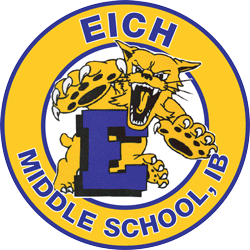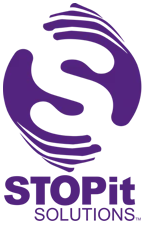Academic Integrity Policy
Introduction
Academic Integrity is a set of values and skills that promote personal integrity and good practice in teaching, learning and assessment. Academic Integrity is influenced and shaped by a variety of factors including peer pressure, culture, parental expectations, role modeling, and taught skills.
The Academic Integrity Policy is developed incorporating concepts and references from multiple documents used at Warren T. Eich Middle School (Eich). First, Eich’s Mission Statement states, “At Eich, we are dedicated to fostering a rigorous and inclusive learning community where academic excellence, empathy, kindness, and integrity are fundamental. Through service and embracing differences, students contribute to local and global communities, inspiring positive change.” Second, academic integrity is part of being “principled,” a learner profile attribute where leaders strive to “act with integrity, with a strong sense of fairness and justice, and with respect for the dignity and rights of people everywhere. We take responsibility for our actions and their consequences.” The Academic Integrity Policy supports Eich’s Wildcat Way school-wide philosophy of Safe, Respectful and Responsible, as well as the IB Academic Integrity Policy.
These qualities, when applied in the classroom environment and production of student work, will establish skills that support sound practices in teaching, learning and assessment. These practices are expected to be introduced, modeled and used both in the school setting and in outside daily practices.
Definitions
Academic Misconduct: Behavior that results in, or may result in, the student or any other student gaining an unfair advantage (or a behavior that disadvantages other students) in one or more assessment components
- Examples of academic misconduct include but are not limited to:
- Falsifying records or documents
- Taking test materials from a classroom or using prohibited electronic devices
- Dishonest behavior during assessments
- Plagiarism
- Collusion
Plagiarism: Copying from generative artificial intelligence (AI), external sources, or other persons. The act of plagiarism can include, but is not limited to, written work, photos, art, performances, etc.
Examples of plagiarism include but are not limited to:
- Directly copying the work of another person without proper documentation, or paraphrasing through online or electronic translators
- Paraphrasing the ideas of another person without proper documentation
- Failing to properly credit any work or answers that have been generated through electronic translation engines, literary summary sources, and inappropriate collaboration with other students
- Recycling previously submitted work by oneself or another student
- Using artwork or pictures (including clip art) that was created by another person without proper citation
Collusion: Working with others where individual work is required
- Examples of collusion include but are not limited to:
- Allowing your work to be copied by another student
- Giving intellectual property (their own or others) to a student with intent to cheat
- Divide and conquer method where you are not the sole author on an assignment given by the teacher, unless this is part of the assignment
- Providing information on how to obtain another student’s intellectual property
- Providing information on how to obtain assessment tasks (prior to examination)
- Forging documents for another student and/or helping copy documents for another student
- Providing unauthorized notes to another student during an assessment
- Sharing assessment information on content and questions with other students
- Sharing passwords or intentionally bypassing district firewalls
Roles and Responsibilities in Supporting Academic Integrity
Faculty (including teachers, counselors, media specialists, aides, case managers, and support personnel)
The following are the expectations and responsibilities with regard to teaching students the concepts in the Academic Integrity Policy so that students can produce their own authentic work:
- Cover the contents of the Academic Integrity policy in the beginning of the year
- Teach components of academic integrity (including ethical use of AI) throughout the year as applicable in each class
- Teach a recognized citation convention (e.g., MLA style in the Humanities) for written and non-written works
- Provide opportunities to practice the appropriate way to use citation conventions
- Communicate appropriate collaboration versus collusion with each assignment
- Demonstrate and model academic integrity in presentations and supporting materials (e.g, posters)
- Report and record violations of academic integrity
- Minimize opportunities for misconduct in assignments/assessment situations
- Communicate with students, parents, counselors, and administrators with concerns and misconduct offenses
- Cover the contents of the Academic Integrity policy through the 8th grade Community Project
- Teachers, administrators and counselors involve students in reflection/discussion in the instance of misconduct
MYP Coordinator
The following are the expectations and responsibilities with regard to overseeing the Academic Integrity Policy so that students can produce their own authentic work:
- Ensuring that all school and IB policies are applied fairly and consistently
- Ensuring that teachers, students and parents and legal guardians have access to the school’s academic integrity policy and the programme-relevant IB regulations
- Reporting suspected instances of student academic misconduct and school maladministration to the school administration and/or the IB
- Supervising all activities related to the investigation of student academic misconduct and school maladministration cases according to the school and/or IB policy.
Students
The following are the expectations and responsibilities with regard to students producing their own authentic work:
- Confirm the understanding of the Academic Integrity Policy
- Practice skills to avoid academic misconduct as applicable in each class
- Report violations of academic integrity to the appropriate school personnel
- Cite any sources used in completing an assignment (this includes generative artificial intelligence (AI), websites, videos, art, photos, music, etc.)
- Acknowledge and understand that putting one’s own name on a paper indicates the work is original and/or cited appropriately
- Ask for guidance when unsure of the appropriate academic integrity expectations
Administration
The following are the expectations and responsibilities with regard to students producing their own authentic work:
- Support Academic Integrity Policy and investigate all faculty reports of academic misconduct through the use of the consequences outlined below
- Ensure that all faculty, students, and parents understand definitions, responsibilities and repercussions in the Academic Integrity Policy
- Ensure the Academic Integrity Policy is applied consistently throughout the school
- Confirm students’ educational rights and the right to due process during investigations of possible violations of the Academic Integrity Policy
- Provide faculty development and guidance on academic referencing systems that are available, including AI
- Provide faculty with material to guide students in maintaining academic integrity
- Make contact with parents/legal guardians and students to communicate misconduct incidents
Parent/Guardian
The following are the expectations and responsibilities with regard to students producing their own authentic work:
- Confirm the receipt and understanding of the Academic Integrity Policy
- Encourage your student to practice academic integrity as outlined in the Academic Integrity Policy
- Encourage your student to help maintain the school culture regarding academic integrity by contacting appropriate personnel when violations occur
- Address concerns with your student and school personnel if academic misconduct instances occur
- Monitor hired tutors or outside help to ensure academic integrity practices
Consequences for Violating Academic Integrity
Academic misconduct, plagiarism, and collusion will be discussed with the student, reported to the parent(s) and the appropriate school personnel. Consequences will be administered in accordance with the school’s discipline plan, based on frequency and severity of the violation.
First offense: Major referral is entered in SWIS, teacher contacts parents with explanation of the violation, that student grade is entered as an IE, and student is allowed to take the same or similar assessment with a maximum score of 5, admin contacts parents with letter that includes the Academic Integrity Policy, detention to complete academic integrity module(s), all of the student’s teachers are notified of student misconduct.
Second offense (not in the same class): Major referral is entered in SWIS, teacher contacts parents with explanation of the violation, that student grade is entered as an IE, and student is allowed to take the same or similar assessment with a maximum score of 5, admin contacts parents with letter that includes the Academic Integrity Policy, detention to complete academic integrity module(s), all of the student’s teachers are notified of student misconduct.
Second offense (in the same class/same offense): Major referral is entered in SWIS, teacher contacts parents with explanation of the violation, that student grade is entered as an IE, and student is not allowed to take the same or similar assessment, admin contacts parents with letter that includes the Academic Integrity Policy, detention to complete academic integrity module(s), all of the student’s teachers are notified of student misconduct.
Subsequent offenses: Major referral is entered in SWIS, teacher contacts parents with explanation of the violation, that student grade is entered as an IE, and student is not allowed to take the same or similar assessment, admin contacts parents with letter that includes the Academic Integrity Policy, detention to complete academic integrity module(s), all of the student’s teachers are notified of student misconduct. Meeting with admin and parents.
Revision Timeline
Review of the Academic Integrity Policy
The plan will be reviewed every two years.
- Original plan created by: Brandon Beadle (Assistant Principal), Meghan Gomez (6th Math/Science Teacher), Kirsty Woolsey (6th Math/Science Teacher), Mark Davis (Science Teacher), Denise Wright (Individuals/Societies Teacher), Amy Murray (Language/Literature Teacher), Scott Benedict (World Language Teacher), Dave Stephens (Individuals/Societies Teacher), Amanda Divelbiss (Arts Teacher), Theresa Pinder (Secretary)
- Revised 5/5/16 by: Lisa Shrider (MYP Coordinator), Becky St. Germaine (Librarian), Brandon Beadle (Assistant Principal), Mark Buljan (Principal), Diane Turner (Administrative Secretary), Lynnette Atkinson (Language/Literature Teacher), Scott Benedict (World Language Department Chair)
- Revised 5/17/17 by: Brandon Beadle (Assistant Principal), Lisa Shrider (MYP Coordinator), Lynnette Atkinson (Language/Literature Teacher), Debbie Allen (Sciences Department Chair), Andrew Padilla (6th Core Department Chair), Debby Fasl (PHE Department Chair)
- Revised 3/2/20 by: Kristina Allison (Assistant Principal), Roxanne Martin (Language/Literature Department Chair), Andrew Padilla (6th Core Department Chair), Language/Literature and Individuals/Societies Teachers, Jill Ivie (Librarian), Scarlett Stoppa (Counselor). Minor revisions in language and consequences done by Lisa Shrider (MYP Coordinator), Roxanne Martin (Language/Literature Department Chair) and Kristina Allison (Assistant Principal) on 4/23/20
- Revised 2/20/25 by: Roxanne Martin (Language/Literature Department Chair), Sara Hastie (6th Core Department Chair), Dave Stephens (Individuals/Societies Department Chair), Cori Tomlin (Sciences Teacher), Tanya Bonifacini (Mathematics Department Chair), Jaime Fagan (6th Mathematics Teacher), Tessa Main (Language Acquisition Department Chair), Jeanne Buljan (PHE Department Chair), Jenn Aldridge (Arts Department Chair), Michael Larsen (MYP Coordinator)
Citation of schools and district used in creating this document
- International Baccalaureate, Academic Integrity in the IB Educational Context, 2014
- Bloomfield Hills Middle and High School, “Academic Integrity Policy”
- White Bear Lake Middle School, “IB MYP Academic Integrity Guidelines”

